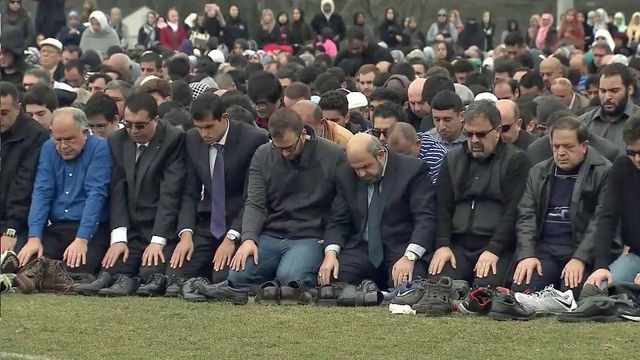Thousands mourn Muslim victims as FBI launches own probe
An estimated 5,500 mourners gathered Thursday in Raleigh at a solemn funeral and prayer service for three Muslim students gunned down in a Chapel Hill condominium in what police call a long-running dispute over parking spaces.
Posted — UpdatedRelatives viewed the victims' bodies in a small building apart from one of Raleigh's largest mosques, where the Muslim families have long been members. Then — because of the sizeable crowd — the service was moved across the street to athletic fields owned by North Carolina State University, where two victims had graduated and one was a student.
That service began after midday Muslim prayers. A man facing east sang an opening prayer. Then the crowd was solemn and silent — only a few children crying in the distance could be heard. A large blue plastic prayer mat lay on the field, and some brought their own to use.
Three coffins sat before a covered stage — in gray, then white and silver. At the service's end, about a dozen people carried each to hearses, which headed to the Islamic Association of Raleigh's Muslim cemetery in Wendell.
Deah Shaddy Barakat, 23; his wife, Yusor Mohammad Abu-Salha, 21; and her sister Razan Mohammad Abu-Salha, 19, were found dead early Tuesday evening at the newlywed couple's home about 3 miles from the University of North Carolina at Chapel Hill – when a neighbor called 911 to report hearing multiple gunshots and people screaming.
Their neighbor, Craig Stephen Hicks, 46, who has described himself as a "gun-toting atheist," is charged with three counts of first-degree murder.
Barakat attended dental school at UNC; his wife had planned to join him in the fall.
Those gathered Thursday grappled with questions about whether the violence had some connection to their Muslim faith. The father of the two slain sisters says hatred of Muslims might explain why the dispute erupted into death.
Police have said they are still investigating any possibilities the crime was hate-motivated.
The women's father, Mohammad Abu-Salha, said police told him each was shot in the head in the couple's apartment and that he is convinced it was a hate crime.
"We are definitely certain that our daughters were targeted for their religion," the women's father, Mohammad Yousif Abu-Salha, told The Associated Press on Thursday. "This is a moment of truth. I have just viewed their bodies."
The killings are fueling outrage among people who blame anti-Muslim rhetoric for hate crimes. A Muslim advocacy organization pressed authorities to investigate possible religious bias. Many posted social media updates with the hashtag #MuslimLivesMatter.
"We understand the concerns about the possibility that this was hate-motivated, and we will exhaust every lead to determine if that is the case," Chapel Hill Police Chief Chris Blue said in an email Wednesday.
Saying the crime appeared to be an isolated incident, Ripley Rand, the U.S. attorney for the Middle District of North Carolina, said his office was monitoring the investigation. Meanwhile, the FBI is helping investigators analyze evidence, and a spokeswoman said Thursday that it has opened a "parallel preliminary inquiry" to determine whether any federal laws were violated.
Mohammad Yousif Abu-Salha also said he had urged law enforcement to look beyond their explanation of a spat.
"This is not a parking dispute," he said. "These children were executed with shots in the back of the head."
He said his older daughter had expressed concern about a neighbor of whom she was afraid.
"(She) felt that he was hateful and he did not like them, who they were and the way they looked," Mohammad Yousif Abu-Salha said.
Thousands remember victims at UNC vigil
About 2,000 people also attended a candlelight vigil for the victims Wednesday evening in The Pit at UNC-Chapel Hill. Several people who knew them spoke about their selflessness as friends recounted kindnesses they had extended to others through the years.
Barakat and Yusor Abu-Salha helped the homeless and raised money to help Syrian refugees in Turkey. They met while helping to run the Muslim Student Association at N.C. State before he went to dental school at UNC. Yusor Abu-Salha, who graduated in December, planned to join her husband in dentistry school in the fall.
"This was like the power couple of our community," said Ali Sajjad, 21, the N.C. State association's current president.
Razan Abu-Salha was visiting them Tuesday from Raleigh, where she was majoring in design at N.C. State.
A vigil was been planned in The Brickyard on N.C. State's campus at 6 p.m. Thursday. As of noon Thursday, more than 1400 people on Facebook indicated plans to attend.
Wednesday night, the Wolfpack honored the victims with a moment of silence before its men's basketball game against the University of Virginia, and students wore green ribbons in their memory.
Starting freshman forward Abdul-Malik Abu, also a Muslim, knew Barakat and Mohammad.
Abu posted a photo on Instagram of himself with the couple earlier Wednesday, with a caption saying he attended their wedding and thanking Barakat for showing "unconditional love."
After the game, Abu said he met Barakat during his recruiting visit.
"He was one of the people that you see that make an impact on your life right away with his happiness, his joy, his support for me before I got to State," Abu said. "Then when I got to State, always excited to see me, always ready to spread good and positive vibes. He ran many charities. Overall, he was just a world-class person."
Vigils were also been planned for Thursday in Washington, D.C., and at Durham Technical Community College, where the suspect had studied.
• Credits
Copyright 2024 by WRAL.com and the Associated Press. All rights reserved. This material may not be published, broadcast, rewritten or redistributed.






